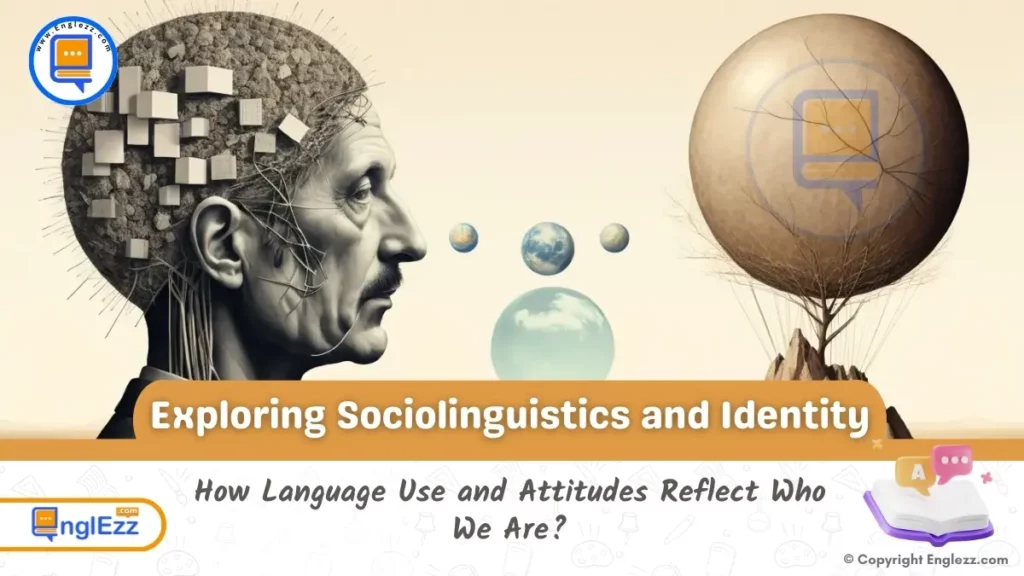Language is an essential part of our identity. The way we speak, the words we use, and the tone we convey all contribute to how others perceive us. Sociolinguistics is the study of how language and society interact. It explores how social factors such as gender, class, and ethnicity can influence the way we communicate and the language we use.
The Power of Words: Exploring Sociolinguistics and Identity
The power of words extends beyond just how we present ourselves to others. It can also impact how we perceive ourselves and how we are perceived by others. In this post, we will delve into the fascinating world of sociolinguistics and explore how our language use can shape our identity.

We will explore topics such as code-switching, language variation, and language attitudes. By the end of this post, you will have a better understanding of how language can shape our lives and the role it plays in our identity.
Introduction to the impact of words on identity
Language is a powerful tool that shapes our identities and influences the way we perceive ourselves and others. Sociolinguistics, the study of how language and society intersect, delves into the intricate relationship between words and identity formation. Our choice of words, accents, dialects, and even the languages we speak can act as markers of our cultural, social, and personal identities.
The impact of words on identity is multifaceted. Language not only reflects who we are but also shapes our perceptions of self and others. It is through language that we express our thoughts, emotions, and experiences, and it plays a vital role in constructing our sense of self. Our words convey our beliefs, values, and affiliations, forming a crucial part of our individual and collective identities.
Moreover, the way we speak, including our accent or dialect, carries social and cultural meaning. It can be a source of pride, representing our heritage and connecting us to a particular community or region. Alternatively, it may evoke stereotypes, discrimination, or marginalization, highlighting the power dynamics inherent in language use.
Language also influences how we are perceived by others. The words we choose, the tone we use, and the linguistic features we employ all contribute to the impressions we make on others. Our language choices can signal our social status, education level, and even our personality traits. They can inspire trust, empathy, and understanding, or create barriers and misunderstandings.
In this blog post, we will explore the fascinating field of sociolinguistics and delve into the intricate ways in which words shape our identities. We will examine the role of language in identity formation, the impact of accents and dialects, the power dynamics embedded in linguistic choices, and the ways in which language can bridge or divide different communities. Join us on this journey as we unravel the power of words and their profound influence on who we are as individuals and as members of society.
Sociolinguistics: Understanding Language and Society
Sociolinguistics is a fascinating field that delves into the intricate relationship between language and society. It explores how language is shaped by social factors such as class, ethnicity, gender, and age, and how it, in turn, influences our identities and interactions with others.
Language is not just a means of communication; it is a powerful tool that reflects and shapes our cultural values, beliefs, and social structures. By studying sociolinguistics, we gain valuable insights into how language is used to construct and negotiate social identities.
One key aspect of sociolinguistics is the study of language variation and change. Languages are not static entities but are constantly evolving and adapting to the needs and preferences of their speakers. Sociolinguists examine how language varies across different social groups and contexts, and how these variations are linked to aspects of identity such as social status, regional affiliation, or membership in a particular community.
- For example, certain dialects or accents may be associated with specific regions or social classes, and the use of particular linguistic features may signal belonging to a particular group.
Understanding these variations and the social meanings attached to them helps us navigate the complex tapestry of linguistic diversity and better appreciate the richness of human expression.
Sociolinguistics also sheds light on language attitudes and ideologies. It explores how certain languages or dialects are valued or stigmatized within a society, and how these attitudes can shape individuals’ perceptions of themselves and others. Language plays a crucial role in constructing social hierarchies, and sociolinguistics helps us challenge linguistic prejudices and promote linguistic equality.
Furthermore, sociolinguistics examines language use in various social contexts, such as formal settings, informal conversations, or online interactions. It investigates how individuals adapt their language choices and styles to fit the norms and expectations of different communicative situations. By understanding these dynamics, we can navigate social interactions more effectively and become more aware of our own linguistic choices and their potential impact on others.
In conclusion, sociolinguistics offers us a fascinating lens through which we can explore the intricate relationship between language and society. It helps us understand how language shapes our identities, influences our interactions, and reflects the diverse tapestry of human culture. By delving into the power of words, we gain a deeper appreciation for the multifaceted nature of language and its profound impact on our lives.
Language Variation and Its Role in Shaping Identity
Language variation plays a profound role in shaping one’s identity. It is through language that we express our thoughts, emotions, and experiences, and it is also through language that we construct our social identities. Sociolinguistics, the study of language in its social context, delves into the intricate relationship between language and identity.
Languages and dialects vary not only across regions but also within social groups. The way we speak, the words we choose, the accents we carry, all contribute to our unique linguistic fingerprint. These variations can be influenced by factors such as geographical location, socioeconomic status, ethnicity, and age, among others.
In many societies, language becomes a marker of social identity, reflecting cultural values and social hierarchies.
- For example, certain dialects or accents may be associated with prestige or power, while others may be stigmatized or marginalized. This linguistic discrimination can have a profound impact on an individual’s sense of self and belonging.
Moreover, language variation extends beyond regional and social dialects. It can also manifest in different speech styles, registers, and even code-switching. Code-switching, the practice of alternating between two or more languages or dialects within a single conversation, is particularly prevalent in multilingual communities. It serves as a way to navigate different social contexts and assert cultural identities.
Language is not merely a tool for communication; it is a powerful tool for self-expression and identity construction. Our language choices not only reflect who we are but also shape how others perceive us. Embracing and celebrating language variation can foster inclusivity and respect for diverse identities, while also promoting a deeper understanding of the richness and complexity of human communication.
Language and Social Class: How words reflect social status
Language plays a significant role in reflecting social status and class distinctions within society. The words we choose to use, the accents we speak with, and even the dialects we employ can all provide subtle yet telling clues about our social standing.
One way in which language reflects social class is through vocabulary choices. The words we use to describe objects, experiences, and emotions can vary depending on our social background.
- For example, individuals from higher social classes may use more sophisticated and nuanced vocabulary, while those from lower social classes may rely on simpler, more colloquial terms.
- This difference in vocabulary can not only indicate a person’s level of education but also provide insight into their cultural and social capital.
Accents and pronunciation also play a role in reflecting social class. Certain accents are associated with higher social status, often due to their historical ties to prestigious institutions or regions. In contrast, accents associated with working-class communities may carry negative stereotypes or be seen as less prestigious. These accent variations can lead to judgments and assumptions about a person’s social background, intelligence, or even trustworthiness.
Additionally, the use of dialects can further highlight social class distinctions. Dialects are regional or social variations of a language that include differences in vocabulary, grammar, and pronunciation. Speakers of different dialects may be perceived differently based on societal perceptions of those dialects. This can result in dialect discrimination, where individuals who speak a non-standard dialect may face prejudice or be stigmatized.
It is important to recognize that language and social class are interconnected, but they do not determine a person’s worth or abilities. Linguistic diversity should be celebrated, and efforts should be made to challenge stereotypes associated with certain dialects or accents. Understanding the power of words in reflecting social status can help us foster inclusivity and promote a more equitable society where linguistic diversity is embraced.
The influence of gender on language and identity
Gender plays a significant role in shaping language and identity. From an early age, individuals are socialized into gender norms and expectations, which in turn affect their linguistic behaviors. Sociolinguistics, the study of language in its social context, explores the complex relationship between language and gender, shedding light on how language can both reflect and reinforce gender identities.
One area where gender differences in language are often observed is in speech patterns and communication styles.
- For example, research has found that women tend to use more standard forms of language, have a higher frequency of politeness markers, and engage in more collaborative and supportive speech.
On the other hand, men are often associated with more assertive and direct speech patterns.
These linguistic differences can be attributed to various factors, including socialization, power dynamics, and societal expectations. For instance, girls may be encouraged to be more nurturing and cooperative, leading to their linguistic behavior reflecting these traits. In contrast, boys may be socialized to be more competitive and assertive, which is reflected in their speech patterns.
The influence of gender on language and identity extends beyond individual behavior. Language also plays a role in constructing and reinforcing gender stereotypes and hierarchies.
- For example, the use of gendered language in job advertisements or professional settings can perpetuate gender biases and limit opportunities for marginalized genders.
However, it is crucial to note that gender is not a binary concept, and sociolinguistics recognizes the existence of diverse gender identities. Non-binary individuals, for instance, may navigate language in unique ways to express their identity and challenge traditional gender norms.
By understanding the influence of gender on language, we can foster inclusivity and promote a more equitable society. Recognizing the power of words and the ways in which language shapes our identities allows us to challenge stereotypes, embrace diverse linguistic practices, and create spaces where individuals of all genders can express themselves authentically.
Ethnicity and language: Exploring cultural identity through words
Language is not just a means of communication; it is deeply intertwined with our cultural identity. Ethnicity and language are intricately connected, as our native language often reflects our cultural heritage and shapes our sense of belonging. Exploring the relationship between ethnicity and language allows us to delve into the rich tapestry of cultural diversity and understand how words play a pivotal role in shaping our identities.
Language serves as a powerful tool for expressing our ethnic identity and maintaining cultural traditions. For instance, different ethnic groups have unique vocabulary, idioms, and expressions that are deeply embedded in their languages. These linguistic nuances reflect the values, customs, and history of a particular ethnic community. They serve as markers of identity, allowing individuals to feel a sense of belonging and connection to their cultural roots.
Moreover, language acts as a bridge between generations, passing down cultural heritage from one generation to the next. Through language, traditions, stories, and oral histories are preserved and shared, ensuring that the cultural identity of a community continues to thrive. Words hold the power to preserve and celebrate ethnic identity, allowing individuals to maintain a strong sense of self and cultural pride.
However, the relationship between ethnicity and language is not static. In multicultural societies, individuals may navigate multiple languages and ethnic identities. Language can become a site of negotiation and hybridity, where individuals blend elements from different cultural backgrounds to create a unique sense of self. This process of language adaptation and code-switching highlights the fluid nature of identity and the dynamic ways in which language shapes our understanding of ethnicity.
Exploring the interplay between ethnicity and language opens up a fascinating realm of sociolinguistics. It allows us to appreciate the diverse linguistic landscapes that exist within societies and recognize the significance of words in shaping cultural identity. By embracing and celebrating linguistic diversity, we can foster a more inclusive and understanding world, where different ethnicities and languages are valued and respected.
Language choices and political affiliation: The role of words in expressing political identity
Language choices play a significant role in expressing one’s political identity. The words we use, the phrases we employ, and the overall tone of our language can convey our political affiliations and beliefs. In the realm of sociolinguistics, this connection between language and politics is a fascinating area of study.
Political affiliation is deeply intertwined with our personal identities, and the words we choose to use can serve as powerful signals of our political leanings. Whether it’s in public speeches, social media posts, or everyday conversations, individuals often consciously or unconsciously select certain words and phrases that align with their political values and ideologies.
- For example, individuals on the conservative end of the spectrum may employ language that emphasizes traditional values, personal responsibility, and limited government intervention.
- They may utilize terms such as “freedom,” “individual rights,” and “small government” to express their political ideals. On the other hand, those with liberal inclinations may opt for language that emphasizes social justice, equality, and collective action.
- Words like “progress,” “equality,” and “social welfare” may be more prevalent in their discourse.
The role of words in expressing political identity extends beyond individual choices as well. Political parties and movements often adopt specific language and slogans to rally support and create a sense of belonging. These linguistic markers serve as a unifying force, reinforcing shared values and creating a recognizable identity within a political group.
However, it is important to note that language and political affiliation are not always straightforward or easily categorized. People may have nuanced or evolving beliefs that do not neatly align with a specific political camp. Additionally, language can be dynamic, and the meaning of certain words or phrases can change over time. Sociolinguistics helps us understand the complexities of language and its connection to political identity.
In conclusion, the power of words in expressing political identity cannot be underestimated. Language choices have the ability to convey our political affiliations, signal our values, and create a sense of belonging within a political community. Understanding the role of words in politics is crucial for comprehending the intricate dynamics of sociolinguistics and identity.
Language and regional identity: Dialects, accents, and cultural belonging
Language plays a significant role in shaping our regional identity and sense of cultural belonging. Dialects, accents, and linguistic variations are not just mere linguistic features but powerful markers of our roots and social identity.
Dialects are variations of a language that develop within a specific geographical region. They reflect the unique history, traditions, and cultural practices of a particular community. From the rolling “r” sounds of Scottish dialects to the rich vocabulary of Jamaican Patois, dialects create a sense of pride and belonging among their speakers. They are a testament to the diversity and richness of human expression.
Accents, on the other hand, refer to the way in which words are pronounced within a particular dialect. Accents can vary greatly even within the same dialect, influenced by factors such as social class, age, and education. An accent can instantly reveal a person’s regional background and can be a source of pride and identity. Think of the distinct Southern drawl of the United States or the melodic intonations of the Irish accent.
However, language and regional identity are not static. They constantly evolve and adapt to societal changes. Migration, globalization, and the increasing interconnectedness of the world have led to the emergence of new hybrid identities and linguistic variations. People often find themselves navigating between multiple languages and dialects, blurring the lines of traditional regional identities.
Nevertheless, language remains a powerful tool for connecting individuals to their communities and preserving cultural heritage. It fosters a sense of belonging, allowing people to express their unique experiences and perspectives. Embracing linguistic diversity not only enriches our understanding of the world but also promotes inclusivity and respect for different cultures.
In conclusion, language and regional identity are intricately intertwined. Dialects, accents, and linguistic variations contribute to our sense of cultural belonging and help us establish connections with others. By appreciating and celebrating linguistic diversity, we can foster a more inclusive and harmonious society that values the power of words in shaping our identities.
The power of words in shaping personal and collective identities
Words have an incredible power to shape our personal and collective identities. Sociolinguistics, the study of language in its social context, delves deep into the ways in which words influence who we are as individuals and as part of a larger community.
From the moment we learn our first words, we are immersed in a world of linguistic interactions that mold our sense of self. The language we use, the words we choose, and the way we express ourselves all contribute to the development of our unique identity.
Our individual identities are not only influenced by the words we use, but also by the words others use to describe us. Labels, whether positive or negative, can have a profound impact on how we perceive ourselves and how others perceive us. The power of words to shape our self-image cannot be underestimated.
Furthermore, words play a crucial role in shaping our collective identities. They help create and reinforce social norms, values, and cultural practices. The language we speak and the words we use connect us to specific communities and shape our sense of belonging.
- Consider, for example, the different languages and dialects spoken within a country.
- Each linguistic community carries its own history, traditions, and cultural markers, all embedded in the words they use.
- These linguistic differences contribute to the richness and diversity of our collective identities.
However, it is important to recognize that the power of words can also be used to marginalize and exclude certain groups. Language can be used as a tool of discrimination and oppression, reinforcing hierarchies and perpetuating stereotypes.
Understanding the power of words in shaping personal and collective identities is essential for fostering inclusivity, empathy, and respect in our interactions. By being mindful of the language we use and the impact it can have, we can create a more inclusive and equitable society where everyone’s identity is valued and celebrated.
Embracing linguistic diversity and fostering inclusive communication
In conclusion, embracing linguistic diversity and fostering inclusive communication is essential for promoting understanding and unity in our increasingly interconnected world. Language plays a crucial role in shaping our identities, and by recognizing and valuing the diverse languages and dialects spoken by individuals and communities, we can create a more inclusive and equitable society.
Sociolinguistics teaches us that language is not just a means of communication, but also a reflection of our social, cultural, and personal identities. By embracing linguistic diversity, we acknowledge the richness and complexity of human expression. We understand that language is not static, but rather constantly evolving and adapting to the needs and experiences of its speakers.
Inclusive communication goes beyond just accepting different languages and dialects; it involves actively engaging with others and making an effort to understand and respect their linguistic backgrounds. This can be achieved through language learning initiatives, translation services, and creating safe spaces where individuals can freely express themselves in their mother tongues.
When we embrace linguistic diversity and foster inclusive communication, we create a society where everyone feels valued and heard. We break down barriers and bridge gaps between individuals from different linguistic communities. We promote empathy, cultural exchange, and mutual understanding.
In our increasingly globalized world, where interactions between people of different linguistic backgrounds are becoming more frequent, it is crucial that we embrace the power of words to build connections rather than create divisions. By celebrating linguistic diversity and fostering inclusive communication, we can create a more harmonious and inclusive society for all.
We hope you found our exploration of sociolinguistics and identity to be thought-provoking and insightful. Language is a powerful tool that shapes our identities and influences how we interact with others. By understanding the nuances of sociolinguistics, we can become more aware of the impact our words have on ourselves and those around us.
This knowledge can foster greater empathy and inclusivity in our daily lives. We encourage you to continue exploring this fascinating field and to reflect on how language plays a role in shaping your own identity. Remember, words have the power to inspire, connect, and transform our world.









Explore sociolinguistics and identity! Uncover how our language choices and attitudes reflect our true selves and influence social connections.